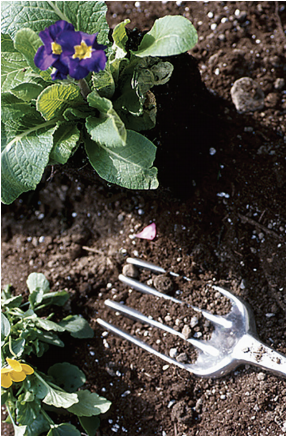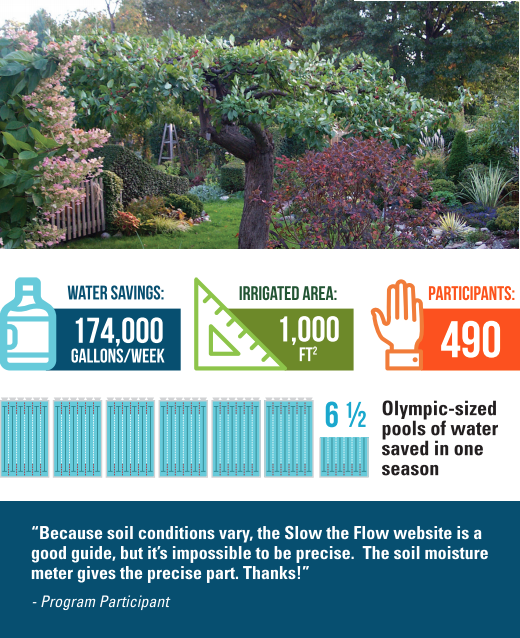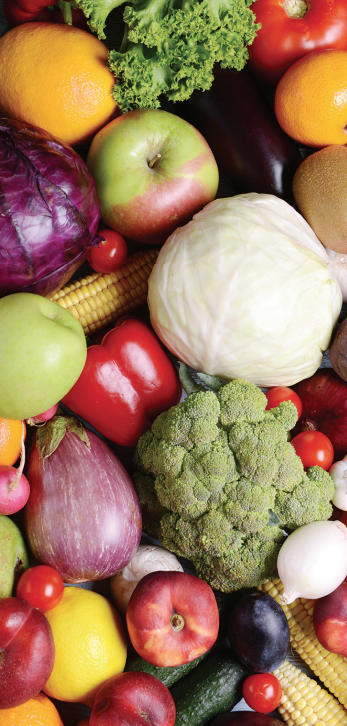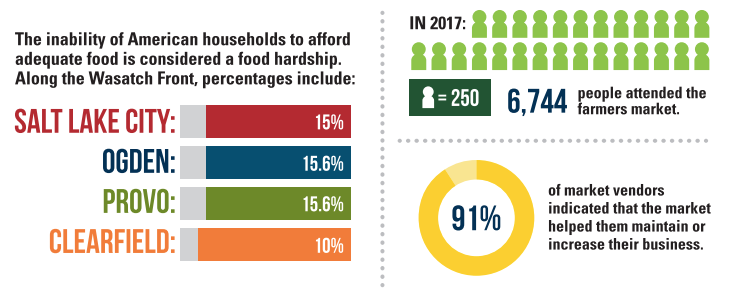Quick Guide to Extension Impacts: Gardening
Introduction: Gardening

Utah State University Extension offers green thumb enthusiasts a wealth of horticultural information from our gardening experts around the state. Each county has a horticultural faculty member available to assist with such things as soil preparation, pruning, planting, proper watering, starting seeds indoors, and all other things gardening.
A recent addition to our offerings are our online gardening classes - a great way to connect with our gardening experts. Training consists of eight courses, each containing a series of short, webinar-style presentations, embedded "how to" videos, and supplemental readings from USU fact sheets and bulletins. These classes were created for people new to gardening in Utah, industry professionals who want to keep current on their knowledge, and everyone in between.
Read below to learn more about these online gardening classes, our Master Gardener program, farmers markets, how to reduce landscape watering, backyard beekeeping, and more.
Find out more at garden.usu.edu. Happy Gardening!
– Mike Caron
Utah State University Extension, assistant professor, horticulture
Soil Moisture Meters Reduce Landscape Watering
 With Utah's population ranked as the fourth fastest growing in the nation, water consumption in Utah will exceed the water supply in the next 43 years, with landscape irrigation currently consuming 53 percent of Utah's potable water.
With Utah's population ranked as the fourth fastest growing in the nation, water consumption in Utah will exceed the water supply in the next 43 years, with landscape irrigation currently consuming 53 percent of Utah's potable water.
To assist with this, USU Extension created the Statewide Soil Moisture Meter Program in 2017 with funding from the USU Water Initiative. A total of 700 soil moisture meters were distributed in six Utah counties, along with watering guidelines. Participants were asked to use the water meter and online resources and to change their water habits accordingly, i.e., not to water when the meter read "wet." Participants responded to an online survey within 4 weeks.
Seventy percent of respondents reduced their landscape watering after using their soil moisture meter. Out of those participants, 23 percent watered 2 less days per week, 28 percent watered 1 less day per week, and 48 percent reduced sporadic watering. Forty percent visited slowtheflow.org for more information.
Estimates show a total water savings of 174,000 gallons per week for 1,000 square feet of irrigated area for the 490 participants who reduced their landscape water use. This means that in one month, participants saved enough water to fill an Olympic-sized swimming pool, which is enough water to fill 6.5 Olympic-sized pools in one growing season.
Farmers Markets Provide Affordable, Fresh Food
 Access to affordable, fresh food is a growing concern in Utah, where the USDA lists 50 locations in 20 of Utah's 29 counties as food deserts. These are defined by:
Access to affordable, fresh food is a growing concern in Utah, where the USDA lists 50 locations in 20 of Utah's 29 counties as food deserts. These are defined by:
1) The lack of grocery stores that sell fresh produce and healthy food options; and
2) Low-income populations living on tight budgets.
In addition, high levels of obesity, diabetes and cardiovascular problems are found in these areas.
To help alleviate this, USU Extension organized a farmers market at the Botanical Center in Kaysville. The market features produce from local farmers, the nearby USU Kaysville Farm, and the Extension Demonstration Garden. Master Gardeners answer gardening questions, and Food $ense teachers provide information on nutrition and menus. To ensure affordability, the market accepts Horizon card (food stamps) and participated in the Double-Up Food Bucks program, matching the first $10 of food stamps with an additional $10 for local produce. To encourage healthy living, a free yoga class is taught each week. Market attendees come from all along the Wasatch Front.
USU Extension efforts provided an important outlet for local farmers, helped increase local food consumption, and provided access to affordable food.

Master Gardeners Help Communities Grow
 USU Extension horticulturists have a challenge keeping up with the needs of the vast number of Utah gardeners. To assist them, the USU Extension Master Gardener Program was developed to provide a network of trained volunteers who can provide research-based horticultural education and technical assistance in gardening and home horticulture.
USU Extension horticulturists have a challenge keeping up with the needs of the vast number of Utah gardeners. To assist them, the USU Extension Master Gardener Program was developed to provide a network of trained volunteers who can provide research-based horticultural education and technical assistance in gardening and home horticulture.
Master Gardeners receive 13-14 weeks of college-level lecture and hands-on training taught by USU Extension specialists and Extension faculty. After completion of the training, USU Master Gardeners are required to provide a minimum of 40 hours of volunteer service to their communities. Approximately 131,000 Utahns were taught or assisted by Master Gardener volunteers through classes, workshops, fairs and events in 2017.

Online Gardening Courses - Instruction on Demand
 There are many would-be gardeners who are unable to attend face-to-face gardening classes. To assist these people, USU Extension launched a series of eight online gardening courses for beginning and intermediate gardeners in 2017.
There are many would-be gardeners who are unable to attend face-to-face gardening classes. To assist these people, USU Extension launched a series of eight online gardening courses for beginning and intermediate gardeners in 2017.
The courses not only help new gardeners, but fill a need within the industry to educate landscapers and nursery professionals, especially those new to the area or the industry, in best management practices in horticulture and gardening in Utah.
Courses include pest management, annuals and perennials, turfgrass, basic botany, soil basics, fruits and nuts, vegetables, and trees and shrubs.
Find out more and sign up for a class at garden.usu.edu.

Produce Provided to SLC Senior Centers
According to the U.S. Census, approximately 15 percent of Utah seniors face the threat of hunger, and over 50,000 seniors reported that they are currently struggling with hunger. Seniors comprise approximately 10 percent of Salt Lake County's total population.
To provide food for these seniors, in 2016, Salt Lake County Master Gardeners began disseminating locally grown produce at nine senior centers in Salt Lake County. Markets were held bi-weekly and resembled vendor booths at local farmers markets. Participating seniors could "shop" for seasonal fruits, vegetables, and herbs to take home, free of charge.
In 2017, the program expanded, and volunteers grew and harvested over 3,800 pounds of fresh produce to disseminate to Salt Lake County seniors at 35 free farmers markets. The approximate value of the produce was nearly $10,000, and 1,520 seniors were provided with free produce.


Sustainability In the Urban Home Environment
 Informal polls have shown an increased desire for those living in urban environments to be more self-reliant and self-sustainable.
Informal polls have shown an increased desire for those living in urban environments to be more self-reliant and self-sustainable.
USU Extension, in partnership with Jordan Valley Water Conservation Garden Park, kicked off the first Urban Homestead Expo in 2017. The full-day event provided classes on beekeeping, water-wise irrigation, fruit tree and berry pruning, composting, food preservation, soap making, backyard chickens and goats, and more. USU Extension experts were on hand to answer questions and provide hands-on guidance, and 12 classes and 10 information booths were offered for the 369 attendees.

Beekeeping Eduction Provides Thriving Hives
According to the Utah Department of Agriculture and Food (UDAF), registrations from homeowner and backyard beekeepers have increased by 800 percent since 2007. This increase in novice hobby beekeepers has also led to an increase in public inquiries regarding how to keep hives healthy and alive.
The Thriving Hive Advanced Beekeeping Series consists of six monthly hands-on workshops that focus on best management practices for keeping a healthy beehive. Participants learn from expert beekeepers around the state as well as state agencies through lectures and hands-on learning. As part of this advanced training, a demonstration bee yard (apiary) was developed at the USU Botanical Center in Kaysville to facilitate the crucial hands-on component of the course. As interest in beekeeping continues to grow, the Thriving Hive series will become an even more important resource, not only for beekeepers, but to ensure a healthy environment.




 Utah 4-H & Youth
Utah 4-H & Youth